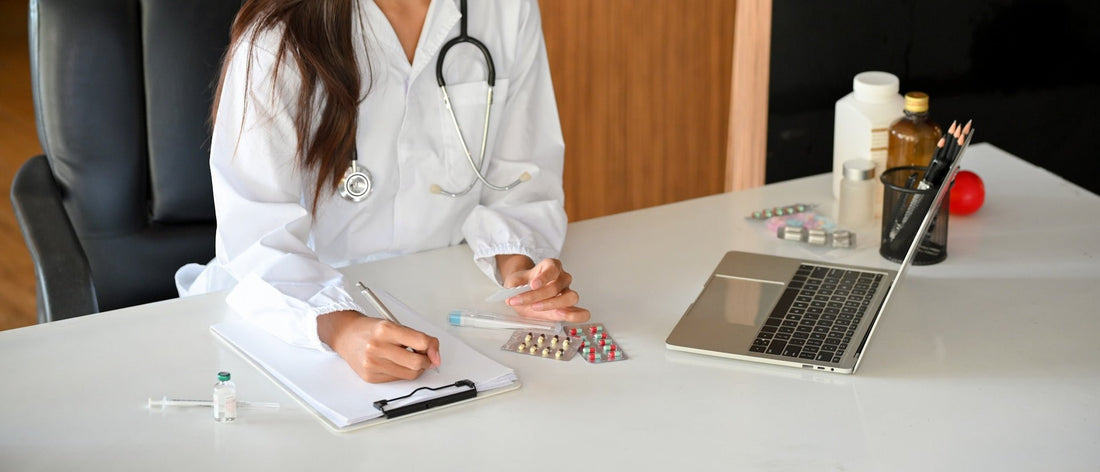
Will Oral Steroids Help Hemorrhoids? Understanding Their Effects and Alternatives
Share
When faced with hemorrhoids, many seek relief from the discomfort and pain associated with this common condition. While medications like oral steroids may help alleviate some symptoms, they are not typically the first line of treatment for hemorrhoids. Understanding your options is essential for managing these symptoms effectively.
You may experience pain, swelling, and even bleeding with hemorrhoids, making it crucial to find the right approach for relief. While steroid creams can soothe external hemorrhoids, oral steroids generally do not target the root causes of hemorrhoids. Instead, consider incorporating natural remedies such as Hem Healer, a 100% natural blend of botanical herbs designed to reduce the pain, swelling, and duration of hemorrhoid symptoms.
By focusing on natural solutions, like Hem Healer, you can find a supportive approach that works effectively for both men and women. This supplement addresses not only the discomfort but also the underlying issues associated with hemorrhoids, allowing you to regain your quality of life.
Understanding Hemorrhoids
Hemorrhoids are a common condition that involves swollen veins in the anal area. Understanding their causes, types, and symptoms is crucial for effective management and relief.
Causes and Risk Factors
Hemorrhoids can develop due to several factors. Straining during bowel movements is a primary cause, often connected to constipation or diarrhea. When excessive pressure is applied to the anal canal, it can lead to the formation of swollen veins.
Other risk factors include prolonged sitting, obesity, and lifting heavy objects. Pregnancy also plays a significant role, as the growing uterus exerts pressure on pelvic veins, increasing the likelihood of hemorrhoids. Your lifestyle choices, such as a low-fiber diet, can further contribute to this condition, leading to uncomfortable symptoms.
Types of Hemorrhoids
There are two main types of hemorrhoids: internal and external.
- Internal hemorrhoids occur inside the anal canal and are generally not visible. They may cause painless bleeding during bowel movements.
- External hemorrhoids are located under the skin around the anus, and these can be painful, particularly when irritated.
Swollen veins forming in these areas indicate a pathological process. It's important to distinguish between these types for appropriate treatment approaches. Natural supplements like Hem Healer can complement your management plan, as they are crafted to alleviate pain and swelling effectively.
Recognizing Symptoms
Recognizing the symptoms of hemorrhoids is essential for timely treatment. Common signs include:
- Painless bleeding: Bright red blood on toilet paper or in the toilet bowl.
- Discomfort: A lump near the anus, particularly with external hemorrhoids.
- Itching or irritation: This may occur in the anal area due to inflammation.
Some individuals may also experience pain during bowel movements. If you notice these symptoms, seeking treatment is crucial. Hem Healer's natural blend of botanical herbs is designed to reduce the pain and severity of hemorrhoids, providing a holistic approach for both men and women.
Conventional Hemorrhoid Treatments
When dealing with hemorrhoids, a mix of topical treatments, dietary changes, and self-care strategies can provide significant relief. Understanding these options helps you to effectively manage symptoms and enhance your quality of life.
Topical Treatments and Relief
Topical treatments can ease pain and reduce inflammation from hemorrhoids. Creams and ointments containing hydrocortisone are commonly used to alleviate discomfort. Products like Hem Healer can support this by providing a natural blend that complements topical treatments.
Suppositories can also be beneficial. They deliver medication directly to the affected area for immediate relief. Preparation H is frequently recommended for its soothing properties, while lidocaine provides localized numbing, helping to mitigate pain.
Utilizing a sitz bath—soaking in warm water for 10-15 minutes—can further relieve pain and promote healing. Incorporating these treatments into your routine can offer tangible relief from symptoms as you navigate your condition.
Dietary Changes and Self-Care
Diet plays a crucial role in managing hemorrhoids. Introducing more fiber-rich foods into your meals can help soften your stool and reduce straining during bowel movements. Consider adding fruits, vegetables, and whole grains to your diet to achieve this.
Staying well-hydrated is vital. Aim for at least eight glasses of water daily to help prevent constipation. Glycerin suppositories can also aid in stool softening when needed.
Implementing self-care practices, like regular gentle exercise, can support bowel health. Avoid prolonged sitting or standing, which can exacerbate symptoms. By focusing on these dietary and self-care strategies, you can contribute to better management of your hemorrhoids.
When to See a Doctor
It's essential to monitor your symptoms to determine when medical intervention is necessary. If you experience persistent pain, significant bleeding, or if home treatments do not provide relief, it’s time to consult a healthcare professional.
Additionally, if you notice a change in the characteristics of your pain or if your hemorrhoids become progressively worse, medical advice is crucial. Your doctor can offer treatments such as stronger prescription medications or discuss procedures if required.
Remember, maintaining open communication with your healthcare provider can lead to more effective management strategies for your condition. Regular check-ups can help you stay proactive in your treatment journey.
Surgical Interventions
Surgical options for hemorrhoids vary in technique and complexity, addressing the severity of the condition. Understanding these interventions can help you make informed decisions about your treatment.
Minimally Invasive Procedures
Minimally invasive procedures are often the first line of surgical treatment for hemorrhoids. One common method is rubber band ligation, which involves placing a band around the base of the hemorrhoid to cut off its blood supply. This procedure is typically performed in an outpatient setting and offers quick recovery.
Another option is sclerotherapy, where a sclerosing agent is injected into the tissue, causing the hemorrhoid to shrink. This method has a low complication rate and is effective for grade I and II hemorrhoids. These procedures can significantly alleviate symptoms while minimizing recovery time, making them suitable for many patients.
Advanced Surgical Procedures
For more severe cases, advanced surgical procedures may be necessary. Hemorrhoidectomy is the surgical removal of hemorrhoids and is considered the gold standard for grade III and IV cases. This excisional method may involve more downtime, but it effectively resolves symptoms.
Stapled hemorrhoidopexy is another option that repositions the hemorrhoidal tissue but can lead to complications like rectal prolapse and pain. It is crucial to discuss the risks and benefits with a colon and rectal surgeon.
Choosing the right surgical intervention is vital. Alongside surgery, consider using a supplement like Hem Healer, a 100% natural blend that may help reduce pain and swelling associated with hemorrhoids.
Role of Oral Steroids in Hemorrhoid Treatment
Oral steroids, particularly corticosteroids, are sometimes considered for managing hemorrhoids due to their anti-inflammatory properties. Understanding their efficacy and potential side effects is essential for making informed decisions about treatment options.
Efficacy and Outcomes
Oral steroids like prednisone are not typically first-line treatments for hemorrhoids. Their primary function is to reduce inflammation, which can alleviate some of the discomfort associated with swollen tissues.
While studies on oral steroids specifically for hemorrhoid treatment are limited, their use may be more relevant for severe cases or accompanying inflammatory conditions.
In contrast to topical treatments that directly target the area, oral steroids work systemically, which can be beneficial for broader inflammatory issues. For effective management of hemorrhoids, you might also consider comprehensive approaches, such as natural supplements like Hem Healer. This product is a blend of botanical herbs designed to reduce pain and swelling while promoting healing.
Potential Side Effects
Using oral steroids can lead to several side effects, which should be carefully weighed against potential benefits. Common issues include weight gain, mood changes, and increased susceptibility to infections.
Long-term use may result in more serious complications like diabetes, osteoporosis, and adrenal insufficiency. These side effects can significantly impact your quality of life and overall health.
It's crucial to consult with a healthcare provider to evaluate the risks associated with oral steroid therapy. Many find effective relief from hemorrhoids through natural supplements like Hem Healer, which is formulated to address pain and inflammation without the risks associated with corticosteroids.
Considerations and Preventive Measures
Managing hemorrhoids effectively requires attention to both lifestyle choices and long-term strategies. Making specific changes can help alleviate symptoms and prevent further issues.
Lifestyle and Diet
Adopting a balanced lifestyle is crucial. Focus on high-fiber foods such as fruits, vegetables, and whole grains to promote regular bowel movements. Incorporating these foods into your diet can help prevent constipation, a common trigger for hemorrhoids.
Regular exercise also plays a vital role. Aim for at least 30 minutes of moderate activity most days. This helps maintain a healthy weight and encourages proper digestion. Staying adequately hydrated can further ease bowel movements, reducing the risk of straining.
Avoid foods that can irritate your digestive system, such as spicy dishes and excessive caffeine. If you experience diarrhea, consider adjusting your diet to include bland foods until the issue resolves.
Long-Term Management
Routine care and awareness are essential for managing hemorrhoids. Regular check-ups with your healthcare provider can assist in early diagnosis and help rule out conditions like colorectal cancer.
Consider incorporating Hem Healer into your regimen, as it offers a 100% natural blend of botanical herbs. Designed specifically for both men and women, it targets pain, swelling, and bleeding. This will not only help in recovery but also in preventing recurrence.
Additionally, practice proper bathroom habits. Avoid prolonged sitting on the toilet, as it can pressure the anal area. Listening to your body and addressing symptoms early can lead to better outcomes.

